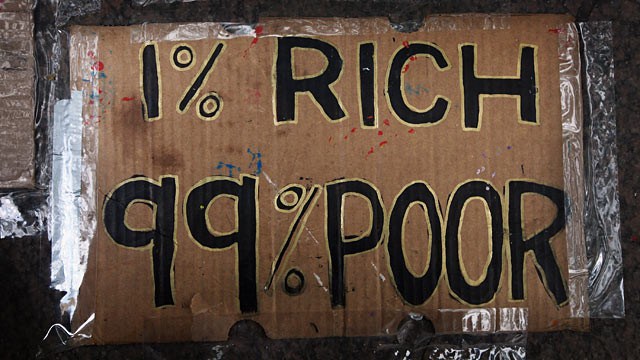 Over the weekend, the Globe and Mail kicked off a two-week-long series that will look at the problem of rising inequality in Canada. It’s a series I’ll be paying close attention to because it deals with an issue that I delve into at length in my just-finished book, Humans 3.0.
Over the weekend, the Globe and Mail kicked off a two-week-long series that will look at the problem of rising inequality in Canada. It’s a series I’ll be paying close attention to because it deals with an issue that I delve into at length in my just-finished book, Humans 3.0.
There’s little doubt we’re living in momentous times. Over the past two decades - since the mainstreaming of the internet and the fall of communism - the twin forces of rapidly advancing technology and globalization have been reshaping every aspect of life. The old world order, which includes not just the global pecking status of nations and economies but the things that people do in their daily lives, is quickly being overturned. In a nutshell, everything is changing.
The Globe is right to look at this issue, especially through the lens of inequality – which looks to be a by-product of those twin forces – but I hope the newspaper doesn’t overdo it. There is, after all, a tendency by the media to be overly cynical when looking at the future in general and technology specifically. The newspaper’s lament about the rising cost of having kids play hockey, for example, is really uncalled for. An already elitist sport is becoming even more elitist - talk about your first-world problems.
Despite the series, inequality really isn’t much of a problem in this country – at least not compared to our southern neighbours. The disparity between a nation’s top and lowest earners is generally represented by the Gini Co-Efficient, coined by Italian statistician Corrado Gini in 1912. The figure rates between zero and one, with zero representing total equality – where every citizen possesses the same amount of wealth as every other citizen – while one equals total inequality, where one person holds all the wealth.
Neither extreme is ever likely to be achieved anywhere, even in the most socialist or dictatorial countries, yet even a small, fractional uptick can represent a big shift in income equality.
Among developed nations, Slovenia, Denmark and Norway are the most equal, with Gini Co-efficients under .25 after taxes and government programs are taken into account. The worst among Organization for Economic Co-operation and Development members are Turkey, Mexico and Chile, which are all over .4. That’s not surprising given that the trio generally have the highest poverty levels among OECD countries.
The United States sits just above this threesome with a rating of .37, which is an undeniable problem. Canada is in a significantly better situation at .32, which is smack dab between the worst and best performers. It’s a far cry from the stronger equality of northern Europe, but not as bad as down south.
Inequality also hasn’t grown as dramatically in Canada as it has in the United States. Canada has seen its co-efficient increase by .02 since the 1970s, whereas the U.S. has seen a relative ballooning of .06 in the same time frame. Again, these look like miniscule numbers, but they do in fact represent big swings.
Still, an increase is an increase. While there’s no cause for immediate alarm, there is no harm in discussing it - and we certainly should be paying attention to the huge global paradigm shift underway. Among the issues the Globe is promising to highlight are education, re-training and public programs. While the newspaper notes there are no silver-bullet solutions to inequality, previous upswings of it have in fact been managed and corrected with exactly those tonics.
The U.S. previously saw big increases in inequality in the 1920s and again around the Second World War. In both cases, social programs - whether it was FDR’s New Deal, which created unemployment insurance and institutionalized unions, or the G.I. Bill, which funded post-secondary employment for soldiers - stemmed the rising tide. With inequality now resurging, it’s becoming increasingly clear that some sort of new, new deal will soon be necessary.
Why Canada has so far managed to avoid most of this fate is up for debate, but it’s entirely possible it’s because of what will certainly be an unpopular theory: better government. Or at least governments that are more in touch with their constituents.
Successive Canadian governments haven’t seem as tied to - or bogged down by - ideology as their American counterparts. The current government is a case in point. When they first took power in 2006, the Conservatives were an ideological beast driven by a thirst for deregulation and the belief that Big Business could solve all problems. Years later, it’s hard to imagine a more interventionist government; Prime Minister Stephen Harper routinely blocks big deals and takeovers and he’s reversed course on deregulation in several areas, most notably telecommunications.
As the recent war on cellphone companies and agitation on airline and credit card issues attests to, the current government has seen the wisdom of adopting populist policies. For all its foibles, steadfastly clinging to ideology is not one of them.
The previous Liberal government was similar; Canadian politics is nothing if not centrist in nature. While critics might lambaste this as wishy-washiness, it is perhaps one of the best and most unique things about Canada – a pragmatism that ultimately trumps single-mindedness. It’s an attitude that fits well with the need for change, of which there will be plenty in the face of the new reality.

Marc Venot
November 11, 2013 at 9:04 pm
More useful is to avoid wasting money like the long gun registry or the botched helicopters contracts.